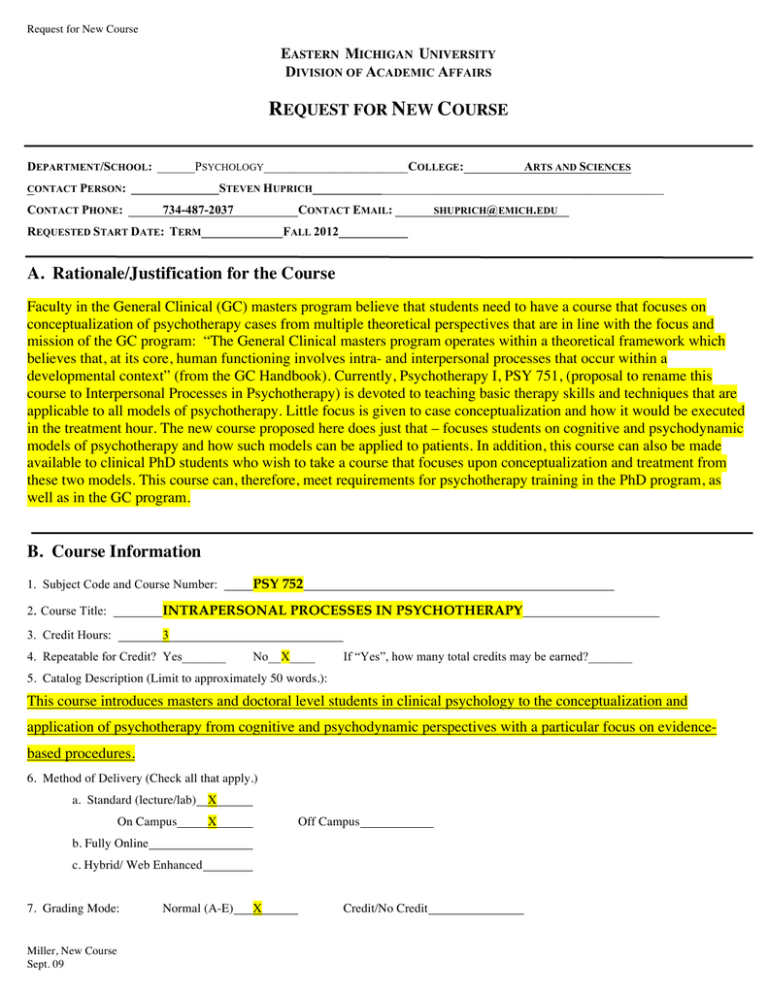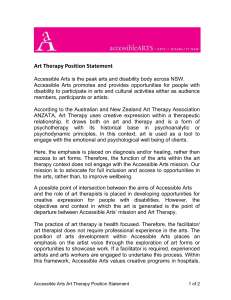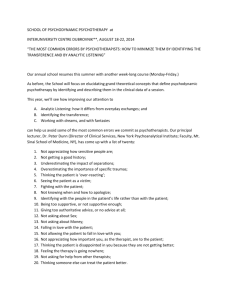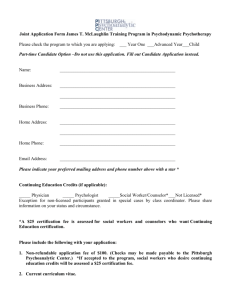R N C
advertisement

Request for New Course EASTERN MICHIGAN UNIVERSITY DIVISION OF ACADEMIC AFFAIRS REQUEST FOR NEW COURSE DEPARTMENT/SCHOOL: ______PSYCHOLOGY_______________________COLLEGE: CONTACT PERSON: ARTS AND SCIENCES ______________STEVEN HUPRICH________________________________________________________ CONTACT PHONE: 734-487-2037 CONTACT EMAIL: SHUPRICH@EMICH.EDU REQUESTED START DATE: TERM_____________FALL 2012___________ A. Rationale/Justification for the Course Faculty in the General Clinical (GC) masters program believe that students need to have a course that focuses on conceptualization of psychotherapy cases from multiple theoretical perspectives that are in line with the focus and mission of the GC program: “The General Clinical masters program operates within a theoretical framework which believes that, at its core, human functioning involves intra- and interpersonal processes that occur within a developmental context” (from the GC Handbook). Currently, Psychotherapy I, PSY 751, (proposal to rename this course to Interpersonal Processes in Psychotherapy) is devoted to teaching basic therapy skills and techniques that are applicable to all models of psychotherapy. Little focus is given to case conceptualization and how it would be executed in the treatment hour. The new course proposed here does just that – focuses students on cognitive and psychodynamic models of psychotherapy and how such models can be applied to patients. In addition, this course can also be made available to clinical PhD students who wish to take a course that focuses upon conceptualization and treatment from these two models. This course can, therefore, meet requirements for psychotherapy training in the PhD program, as well as in the GC program. B. Course Information 1. Subject Code and Course Number: PSY 752 2. Course Title: INTRAPERSONAL PROCESSES IN PSYCHOTHERAPY 3. Credit Hours: 3 4. Repeatable for Credit? Yes_______ No__X____ If “Yes”, how many total credits may be earned?_______ 5. Catalog Description (Limit to approximately 50 words.): This course introduces masters and doctoral level students in clinical psychology to the conceptualization and application of psychotherapy from cognitive and psychodynamic perspectives with a particular focus on evidencebased procedures. 6. Method of Delivery (Check all that apply.) a. Standard (lecture/lab) X On Campus X Off Campus b. Fully Online c. Hybrid/ Web Enhanced 7. Grading Mode: Miller, New Course Sept. 09 Normal (A-E) X Credit/No Credit New Course Form 8. Prerequisites: Courses that MUST be completed before a student can take this course. (List by Subject Code, Number and Title.) PSY 751 Interpersonal Processes in Psychotherapy AND 731 Prepracticum in Interpersonal Processes in Psychotherapy 9. Concurrent Prerequisites: Code, Number and Title.) Courses listed in #5 that MAY also be taken at the same time as a student is taking this course. (List by Subject NA 10. Corequisites: Courses that MUST be taken at the same time as a student in taking this course. (List by Subject Code, Number and Title.) NA 11. Equivalent Courses. A student may not earn credit for both a course and its equivalent. A course will count as a repeat if an equivalent course has already been taken. (List by Subject Code, Number and Title) NA 12. Course Restrictions: a. Restriction by College. Is admission to a specific College Required? College of Business Yes No College of Education Yes No b. Restriction by Major/Program. Will only students in certain majors/programs be allowed to take this course? Yes X No If “Yes”, list the majors/programs General Clinical Master’s program (PSYC) Clinical Behavioral Master’s program (PSYB) Clinical Psychology PhD program (PSYD) Departmental permission c. Restriction by Class Level Check all those who will be allowed to take the course: Undergraduate Graduate All undergraduates_______ All graduate students____ Freshperson Certificate Sophomore Masters Junior Specialist Senior Doctoral Second Bachelor________ UG Degree Pending_____ Post-Bac. Tchr. Cert._____ Low GPA Admit_______ X X Note: If this is a 400-level course to be offered for graduate credit, attach Approval Form for 400-level Course for Graduate Credit. Only “Approved for Graduate Credit” undergraduate courses may be included on graduate programs of study. Miller, New Course Sept. ‘09 Page 2 of 8 New Course Form Note: Only 500-level graduate courses can be taken by undergraduate students. Undergraduate students may not register for 600-level courses d. Restriction by Permission. Will Departmental Permission be required? Yes No X (Note: Department permission requires the department to enter authorization for every student registering.) 13. Will the course be offered as part of the General Education Program? Yes N X If “Yes”, attach Request for Inclusion of a Course in the General Education Program: Education for Participation in the Global Community form. Note: All new courses proposed for inclusion in this program will be reviewed by the General Education Advisory Committee. If this course is NOT approved for inclusion in the General Education program, will it still be offered? Yes No C. Relationship to Existing Courses Within the Department: 14. Will this course will be a requirement or restricted elective in any existing program(s)? Yes X No If “Yes”, list the programs and attach a copy of the programs that clearly shows the place the new course will have in the curriculum. Program General Clinical Master’s program Program 15. Will this course replace an existing course? Yes Required X Required No Restricted Elective Restricted Elective X 16. (Complete only if the answer to #15 is “Yes.”) a. Subject Code, Number and Title of course to be replaced: b. Will the course to be replaced be deleted? Yes No 17. (Complete only if the answer #16b is “Yes.”) If the replaced course is to be deleted, it is not necessary to submit a Request for Graduate and Undergraduate Course Deletion. a. When is the last time it will be offered? Term Year b. Is the course to be deleted required by programs in other departments? Contact the Course and Program Development Office if necessary. Yes No c. If “Yes”, do the affected departments support this change? Yes No If “Yes”, attach letters of support. If “No”, attach letters from the affected department explaining the lack of support, if available. Outside the Department: The following information must be provided. Contact the Course and Program Development office for assistance if necessary. 18. Are there similar courses offered in other University Departments? If “Yes”, list courses by Subject Code, Number and Title Yes No X 19. If similar courses exist, do the departments in which they are offered support the proposed course? Yes No If “Yes”, attach letters of support from the affected departments. If “No”, attach letters from the affected department explaining the lack of support, if available. Miller, New Course Sept. ‘09 Page 3 of 8 New Course Form D. Course Requirements 20. Attach a detailed Sample Course Syllabus including: a. b. c. d. e. f. g. h. Course goals, objectives and/or student learning outcomes Outline of the content to be covered Student assignments including presentations, research papers, exams, etc. Method of evaluation Grading scale (if a graduate course, include graduate grading scale) Special requirements Bibliography, supplemental reading list Other pertinent information. NOTE: COURSES BEING PROPOSED FOR INCLUSION IN THE EDUCATION FOR PARTICIPATION IN THE GLOBAL COMMUNITY PROGRAM MUST USE THE SYLLABUS TEMPLATE PROVIDED BY THE GENERAL EDUCATION ADVISORY COMMITTEE. THE TEMPLATE IS ATTACHED TO THE REQUEST FOR INCLUSION OF A COURSE IN THE GENERAL EDUCATION PROGRAM: EDUCATION FOR PARTICIPATION IN THE GLOBAL COMMUNITY FORM. E. Cost Analysis (Complete only if the course will require additional University resources. Fill in Estimated Resources for the sponsoring department(s). Attach separate estimates for other affected departments.) Estimated Resources: Year One Year Two Year Three Faculty / Staff $_________ $_________ $_________ SS&M $_________ $_________ $_________ Equipment $_________ $_________ $_________ Total $_________ $_________ $_________ F. Action of the Department/School and College 1. Department/School Vote of faculty: For ___16_______ Against ____0______ Abstentions ____1______ (Enter the number of votes cast in each category.) Department Head/School Director Signature Date 2. College/Graduate School A. College College Dean Signature Date B. Graduate School (if Graduate Course) Graduate Dean Signature Date G. Approval Associate Vice-President for Academic Programming Signature Miller, New Course Sept. ‘09 Date Page 4 of 8 New Course Form COURSE SYLLABUS PSY 752: INTRAPERSONAL PROCESSES IN PSYCHOTHERAPY Eastern Michigan University Fall 2012 Professor: Phone Number: Electronic Mail: Office: Class Hours: Classroom: Steven Huprich, PhD (734) 487-2037; (248) 807-2159 shuprich@emich.edu Mark Jefferson Science Complex 361A 12:30-1:45pm MW Mark Jefferson Science Complex 328 Course Description: This course is open to masters and doctoral students in clinical psychology. This course will develop students’ skills in conceptualization and application of their conceptualization to psychotherapy patients from psychoanalytic/psychodynamic and cognitive perspectives. A significant portion of the course will be to the presentation of case material, conceptualized from these perspectives, with a discussion of how theory guides and directs treatment. At the conclusion of the course, students will be expected to describe cases from these perspectives and articulate ways in which their conceptual model has and will guide their practice of psychotherapy. Prerequisites: PSY 751/731; PSY 646 strongly preferred. Required Readings: Beck, J. S. (2011). Cognitive therapy: Basics and beyond (2nd edition). New York, NY: Guilford. Gabbard. G. O. (2010). Long-term psychodynamic psychotherapy: A basic text (2nd ed.). Washington, DC: American Psychiatric Press. Huprich, S. K. (2009). Psychodynamic psychotherapy: Conceptual and empirical foundations. New York: Routledge. McWilliams, N. (2004). Psychoanalytic psychotherapy: A practitioner’s guide. New York: Guilford. Grading Procedures: Your grade will be based on the following assignments. Each of these will be discussed in more detail in class. 1. Questions for each set of readings –For these assignments, you will be asked to provide 4-6 discussion questions to me in writing for the set or readings to be discussed on the upcoming days. I have highlighted the due dates on the syllabus. There are no points awarded for submitting these; however, if you do not submit the questions, you will lose 2% points from your final grade for each missed set of questions. 2. Reaction paper to Dr. Jacques Barber – You are required to submit a 2-3 page reaction paper, which is due on Oct. 8. (25 points). I will provide articles for reference prior to his presentation. 3. Class discussion – This course is built upon the assumption that students will read and come prepared to discuss the readings in class. Each set of readings has much content, and in order for you to master the material, it is crucial you discuss the content, raise questions where and when appropriate, and express your understanding of the material. This grade is determined by the instructor’s perception of your participation and discussion. He will provide you with feedback around mid-term as to what grade you have earned at that point in the semester (25 points). 4. Summary and discussion paper for Judith Beck text – This paper will be a summary of the material presented in Judith Beck’s text (roughly ½ of the paper), with a subsequent reaction to this material. You should critically evaluate the utility of Dr. Beck’s approach, consider the validity and utility of what she Miller, New Course Sept. ‘09 Page 5 of 8 New Course Form suggests, and compare/contrast her ideas with those inherent in a psychodynamic approach (roughly ½ the paper). The paper should be 18-20 pages double-spaced (excluding references or tables). (150 points). 5. Case presentation – If you are currently in a practicum, you will be asked to present a case for two consecutive class periods. For the presentation, you will be asked to discuss three major content areas: general background information about the patient and the progress of treatment, a cognitive conceptualization of the case and discussion of relevant therapy issues, and a psychoanalytic/psychodynamic conceptualization of the case and discussion of relevant therapy issues. (100 points) 6. Case write-up - Regardless of a practicum experience or not, you will be asked to write about a case of yours or of a fellow student’s and discuss it from cognitive and psychoanalytic/psychodynamic perspectives, including attention devoted to transference and countertransference issues. You will be graded on the conceptual clarity, grammar, style, cohesiveness, and critical thinking. This case may not be one that is presented. I will provide you with examples of case conceptualization write-ups from psychoanalytic/psychodynamic perspectives. This paper should be about 12-15 pages long. (150 points) Additionally, you should be aware that four or more absences will result in the lowering of your final grade by one-half letter (e.g., 4 = A- max; 5 = B+ max, etc.). As noted earlier, failure to turn in 2-3 discussion questions for the readings before the class period in which the topic is set to be discussed will result in the deduction of 2% points from your final grade for each set of questions not submitted. The following metric will be used to assign final grades based upon the percentage of points earned: 93-100% (A); 90-92% (A-), 87-89% (B+), 83-86% (B), 80-82% (B-). Grades below 80% of the total points will be evaluated on a case by case basis by the instructor to determine which of the following grades is appropriate: C, E, or Incomplete. Expectations for Students: There are certain expectations that I have of students. Most, if not all, of these are likely your expectations, too. While this may seem implicit, experience has suggested that these issues best be made explicit at the beginning of the semester. If you have any questions, concerns, or difficulties in the course, please ask questions. This is my job, and I want you to be successful in your learning. In other words, please use me as a learning resource. While I will always answer your questions in class, I am also happy to schedule an appointment with you during office hours or another time. Please be on time. It is frustrating and irritating to other students (and sometimes the professor) when a student comes in late. This disrupts others’ concentration, note taking, and listening. If this becomes a problem, the professor will speak directly with you about this. Turn off your cell phones and pagers. They are not to be engaged during class at any time. Like the above, when these devices ring or buzz, they are disrupting to those around you. Talk to others any time except for when class has begun. Private conversations, whispering, etc. disrupt others around you and make it difficult for students to learn. If this becomes a problem, the professor will speak directly with you. Ongoing problems with any of the aforementioned behaviors may result in a formal referral to the Office of Student Judicial Services. Respect. This is the essence of these aforementioned expectations, and I hope that we will all work hard to be respectful and polite toward each other. If you are not certain if what you are doing or want to do is appropriate, ask whether it is respectful of others. All these issues are addressed in the Student Conduct Code, which may be accessed at: www.emich.edu/student conduct/. Other Issues: Religious holidays: Current University policy recognizes the rights of students to observe religious holidays without penalty to the student. Students will provide advance notice to the instructor in order to make up work they miss (including examinations) as a result of their absence from class due to observance of religious holidays. If satisfactory arrangements cannot be made with the instructor, the student may appeal to the Psychology Department Head. Miller, New Course Sept. ‘09 Page 6 of 8 New Course Form Academic dishonesty: Academic dishonesty, including all forms of cheating, falsification, and/or plagiarism, will not be tolerated in this course. Penalties for an act of academic dishonesty may range from receiving a failing grade for a particular assignment to receiving a failing grade for the entire course. In addition, you may be referred to the Office of Student Conduct and Community Standards for discipline that can result in either a suspension or permanent dismissal. The Student Conduct Code contains detailed definitions of what constitutes academic dishonesty but if you are not sure about whether something you are doing would be considered academic dishonesty, consult with the course instructor. You may access the code online at: www.emich.edu/student conduct/. The Family Educational Rights and Privacy Act: FERPA is a federal law designated to protect the privacy of a student’s education records and academic work. The law applies to all schools and universities which receive funds under an applicable program of the U.S. Department of Education and is applicable to students at EMU. All files, records, and academic work completed within this course are considered educational records and are protected under FERPA. It is your right as a student in this course to expect that any materials you submit in this course, as well as your name and other identifying information, will not be viewable by guests or other individuals permitted access to the course. The exception will be only when you have given explicit, written, signed consent. Verbal consent or email is insufficient. Special needs accomodations/disabilities: If you wish to be accommodated for your disability, EMU Board of Regents Policy 8.3 requires that you first register with the Students with Disabilities Office (SDO) in 240 EMU Student Center. You may contact SDO by telephone (734-487-2470). Students with disabilities are encouraged to register with the SDO promptly as you will only be accommodated from the date you register with them forward. No retroactive accommodations are possible. Tentative Schedule: Sept. 5 Introduction to course; Course logistics; Assign presentation dates Introduction to psychodynamic therapy Sept. 10 No class today Questions due: Huprich, Chs. 5 & 9; Gabbard, Chs. 3-5; McWilliams, Ch.1-4 Sept. 12 Psychodynamic therapy (Huprich, 2009, Chs. 1-5; Gabbard, 2010, Chs. 3-8; Mc Williams, Chs. 2-7) Sept. 17 Psychodynamic therapy Questions due: Gabbard, Ch. 6-8; McWilliams, Chs. 5-7 Sept. 19 Psychodynamic therapy Sept. 24 Psychodynamic therapy Sept. 26 Psychodynamic therapy Oct. 1 Dr. Barber Presentation during class Oct. 3 No class today Oct. 8 Psychoanalytic/psychodynamic therapy Reaction paper due from Dr. Barber’s talk Oct. 10 Cognitive therapy discussion (Beck, 1995) Oct. 15 Cognitive therapy discussion Cognitive therapy paper due Miller, New Course Sept. ‘09 Page 7 of 8 New Course Form Oct. 15 Case presentation 1 Oct. 17 Case presentation 1 Oct. 22 Case presentation 2 Oct. 24 Case presentation 2 Oct. 29 Case presentation 3 Oct. 31 Case presentation 3 Nov. 5 Case presentation 4 Nov. 7 Case presentation 4 Nov. 12 Case presentation 5 Nov. 14 Case presentation 5 Nov. 19 Discussion (Huprich, 2009, Ch. 10) Nov. 21 No Class today Nov. 26 Case presentation 6 Nov. 28 Case presentation 6 Dec. 3 Case presentation 7 Dec. 5 Case presentation 7 Dec. 10 Case presentation 8 Dec. 12 Case presentation 8 Dec. 17 Noon—final case discussion due Miller, New Course Sept. ‘09 Page 8 of 8







![UW2 - Psychiatric Treatments [2014]](http://s3.studylib.net/store/data/006859622_1-db6167287f6c6867e59a56494e37a7e7-300x300.png)